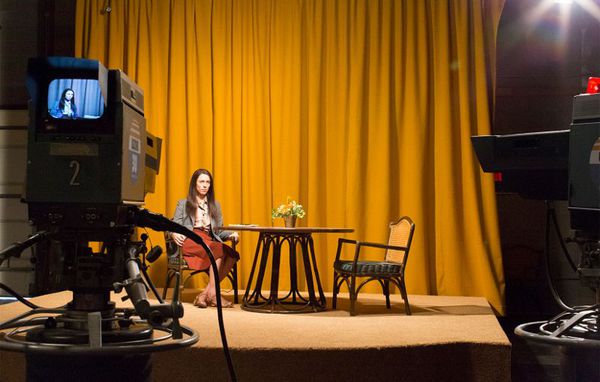Eye For Film >> Movies >> Christine (2016) Film Review
Christine
Reviewed by: Amber Wilkinson

Can a fact be a spoiler? It's a tricky question when the meat of the matter is something that is known quite well in the US but less so in the UK. With that in mind, this review may be about to spoil a key fact of Christine for you, so if you do not know the story of Christine Chubbuck and want to come to the film from that position, now is the time to stop reading.
That said, I would argue that knowing where this film is heading - to the tragic on-air suicide of TV news reporter Chubbuck in 1974 - is one of the reasons why Antonio Campos' gripping film works so well. As we are aware that she is a woman on the edge, we are able to see beyond the surface of her interactions in a way that those around her, and even she, cannot.
To them Chubbuck (Rebecca Hall) is a feisty and prickly soul for sure. She is highly ambitious and fights her corner in the news conference sessions, speaking her mind and standing fiercely against sensationalism. What they are less aware of is how ruthlessly hard on her own on-air performances she is, watching them on a loop for signs of weakness.
Craig Shilowich's careful scripting avoids all the usual mental illness cliches and histrionics to help us sympathise with her even in her most unpleasant moments at the same time as being able to empathise with those around her who fail to realise the depth of the problem. Although she holds down a steady job, shares her home with her mum (J. Smith-Cameron) and even indulges in some awkward flirtation with her studio's handsome news anchor George (Michael C Hall), she is lonely in a way that others fail to fully comprehend.
This is not just a character study of Christine but an examination of the minutiae of human interaction and the way in which well-meaning people can do things that only serve to exacerbate someone else's sense of self-hate. In a pivotal scene, a date with George that proves to be catastrophic for Christine and is made all the more disturbing to watch because of the fact that he is so well-intentioned. Rather than simply keep Christine front and centre at all times, Shilowich pulls away from her, to show others talk about her in her absence, cleverly illustrating the fact that though she can be difficult, she is in no way ostracised and rather it is her perception of other people's opinions that is adding to her plight.
Campos' film is also grapples with the Seventies conflicting ideas of 'feminism'. At one point it is directly emphasised: "You know what you're problem is? You're a feminist." she is told. But Christine is caught. Driven to succeed and trying to get on in a man's world, she finds herself unable to let her guard down sufficiently to get the emotional support that could well have made a difference. The irony of the "girl power" Mary Tyler Moore show theme playing at the end of the film cuts deep.
Hall proves that, like so many actresses who have become known for their supporting roles, that she can more than carry a movie. Her intense performance is unflinching and gives a real sense of a woman desperate for connection who, instead, finds herself gradually imploding. This coupled with terrific support from the other Hall in full smarmer-or-charmer mode and Timothy Simons as a weather man almost as lonely as Christine, makes for a heartbreaking and compelling watch. We are never asked to pity Christine but instead to empathise with this woman on the verge of an abyss.
Reviewed on: 01 Mar 2016















